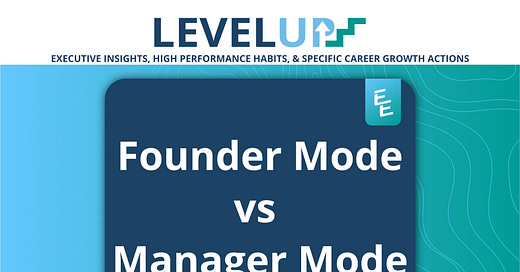Founder Mode vs Manager Mode
Which 'mode' is best for you? (plus, more insights from Brian Chesky on what happened at Airbnb)
Hello, it’s Ethan & Jason. Welcome to a *paid subscriber-only* edition of Level Up: Your source for executive insights, high performance habits, and specific career growth actions.
If you are not a paid subscriber, here’s popular articles you missed:
Founder Mode: Jeff Bezos once threatened to spend every penny Amazon had on a Kindle project when his CFO tried to reign him in.
CFO: "Jeff, we only have so much money."
Jeff: "How much is that? I might want to spend it."
The big benefit of being the founder is that you can risk the company in the way a CEO normally cannot. Back when this happened, around 2011, Jeff owned about 19% of Amazon, which meant for practical purposes no one could remove him as CEO.
Thus, he could take any risk he chose in a way that an appointed CEO cannot.
Jeff also audited deep into the organization at times. A new college graduate engineer on my team emailed Jeff about an idea. Jeff reviewed it with him and then assigned senior leaders, who were against it, to build it.
At the same time, there are plenty of so-called manager mode CEOs and companies who do very well. Warren Buffet did not even found Berkshire Hathaway — he bought it. Larry and Sergey famously brought in Eric Schmidt. Starbucks was small time until Howard Schultz got there, 11 years after it was founded.
"Founder Mode" is still hot on people’s mind after Brian Chesky's (Cofounder & CEO of Airbnb) talk at Y Combinator and Paul Graham's blog about it (interesting Steve Jobs tidbit below from the blog):
For example, Steve Jobs used to run an annual retreat for what he considered the 100 most important people at Apple, and these were not the 100 people highest on the org chart. Can you imagine the force of will it would take to do this at the average company? And yet imagine how useful such a thing could be. It could make a big company feel like a startup. Steve presumably wouldn't have kept having these retreats if they didn't work. But I've never heard of another company doing this. So is it a good idea, or a bad one? We still don't know. That's how little we know about founder mode.
I've seen founders who were disasters and completely could not scale.
They needed help.
If they got it, their companies sometimes did well (it depended on who they hired). If they did not, those founders failed.
It is great to point to the amazing founders who led their companies this way.
I've had the chance to work with Jeff Bezos and to interview with Elon Musk. This much is clear - they are both smarter and more driven than most us will ever be.
It is an oversimplification to say "Founder Mode" is the only or the best way:
First, there are counterexamples of "professional management" working out extremely well.
Second, many founders who have a great initial idea do not have the "complete package" to lead like Jobs, Bezos, or Musk.
What I do agree with strongly is that a leader must be willing to cut through levels and talk to whoever they need to in the organization. There is a difference between doing this to the point where other leaders cannot run their own areas though.





